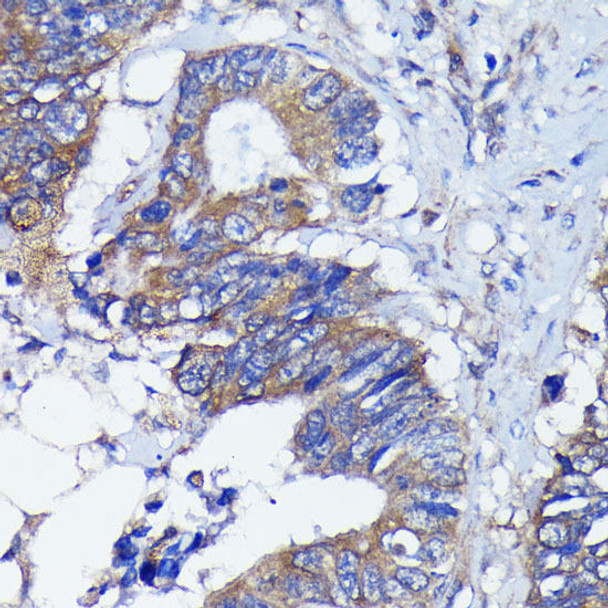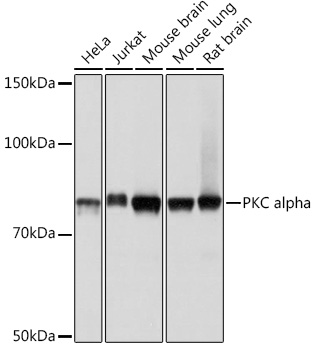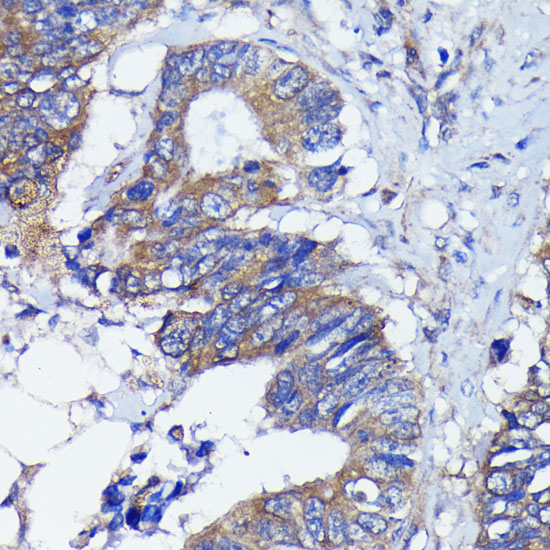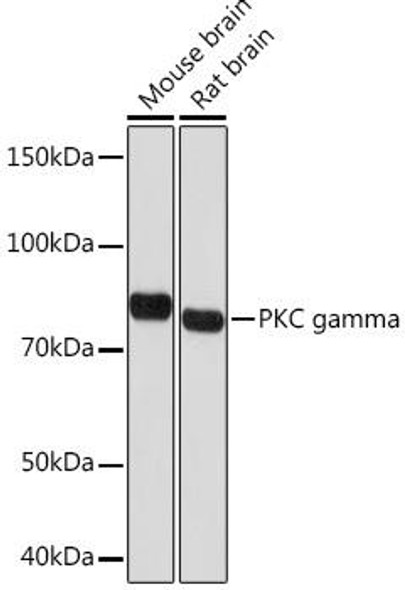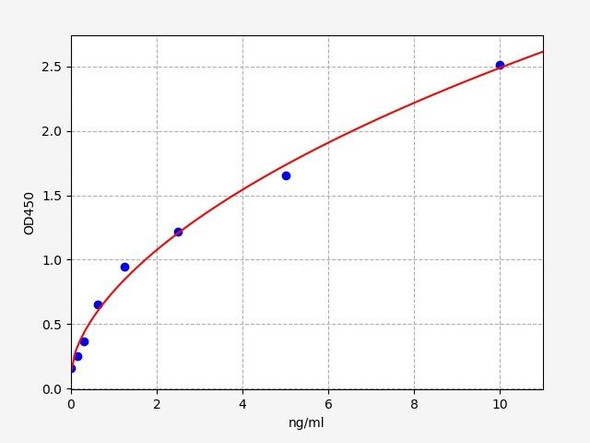Anti-PKC alpha Antibody (CAB11107)
- SKU:
- CAB11107
- Product type:
- Antibody
- Reactivity:
- Human
- Mouse
- Rat
- Host Species:
- Rabbit
- Isotype:
- IgG
- Antibody Type:
- Monoclonal Antibody
- Research Area:
- Cardiovascular
Description
| Antibody Name: | Anti-PKC alpha Antibody |
| Antibody SKU: | CAB11107 |
| Antibody Size: | 20uL, 50uL, 100uL |
| Application: | WB IHC |
| Reactivity: | Human, Mouse, Rat |
| Host Species: | Rabbit |
| Immunogen: | Recombinant protein of human PKC alpha. |
| Application: | WB IHC |
| Recommended Dilution: | WB 1:500 - 1:2000 IHC 1:50 - 1:200 |
| Reactivity: | Human, Mouse, Rat |
| Positive Samples: | HeLa, Jurkat, Mouse brain, Mouse lung, Rat brain |
| Immunogen: | Recombinant protein of human PKC alpha. |
| Purification Method: | Affinity purification |
| Storage Buffer: | Store at -20°C. Avoid freeze / thaw cycles. Buffer: PBS with 0.02% sodium azide, 0.05% BSA, 50% glycerol, pH7.3. |
| Isotype: | IgG |
| Sequence: | Email for sequence |
| Gene ID: | 5578 |
| Uniprot: | P17252 |
| Cellular Location: | Cell membrane, Cytoplasm, Mitochondrion membrane, Nucleus, Peripheral membrane protein |
| Calculated MW: | 76kDa |
| Observed MW: | 76kDa |
| Synonyms: | PRKCA, AAG6, PKC-alpha, PKCA, PRKACA, PKC alpha |
| Background: | Protein kinase C (PKC) is a family of serine- and threonine-specific protein kinases that can be activated by calcium and the second messenger diacylglycerol. PKC family members phosphorylate a wide variety of protein targets and are known to be involved in diverse cellular signaling pathways. PKC family members also serve as major receptors for phorbol esters, a class of tumor promoters. Each member of the PKC family has a specific expression profile and is believed to play a distinct role in cells. The protein encoded by this gene is one of the PKC family members. This kinase has been reported to play roles in many different cellular processes, such as cell adhesion, cell transformation, cell cycle checkpoint, and cell volume control. Knockout studies in mice suggest that this kinase may be a fundamental regulator of cardiac contractility and Ca(2+) handling in myocytes. |
| UniProt Protein Function: | PKCA: an AGC kinase of the PKC family. A classical PKC downstream of many mitogenic and receptors. Classical PKCs are calcium-dependent enzymes that are activated by phosphatidylserine, diacylglycerol and phorbol esters. Contains a pseudo-substrate autoinhibitory domain that binds to the catalytic domain preventing its activation in the absence of cofactors or activators. |
| UniProt Protein Details: | Protein type:EC 2.7.11.13; Protein kinase, Ser/Thr (non-receptor); Oncoprotein; Kinase, protein; Protein kinase, AGC; AGC group; PKC family; Alpha subfamily Chromosomal Location of Human Ortholog: 17q22-q23.2 Cellular Component: nucleoplasm; photoreceptor outer segment; mitochondrion; cell soma; endoplasmic reticulum; perinuclear region of cytoplasm; apical part of cell; mitochondrial membrane; dendrite; cytoplasm; plasma membrane; cytosol Molecular Function:protein serine/threonine kinase activity; protein binding; enzyme binding; protein kinase C activity; zinc ion binding; calcium-dependent protein kinase C activity; ATP binding; protein kinase activity Biological Process: phototransduction, visible light; extracellular matrix organization and biogenesis; positive regulation of cell adhesion; nerve growth factor receptor signaling pathway; regulation of muscle contraction; mitotic nuclear envelope disassembly; positive regulation of lipopolysaccharide-mediated signaling pathway; negative regulation of insulin receptor signaling pathway; signal transduction; positive regulation of mitotic cell cycle; protein amino acid phosphorylation; induction of positive chemotaxis; synaptic transmission; negative regulation of cell proliferation; chondrocyte differentiation; angiogenesis; cell adhesion; positive regulation of macrophage differentiation; regulation of peptidyl-tyrosine phosphorylation; regulation of the force of heart contraction; inactivation of MAPK activity; epidermal growth factor receptor signaling pathway; platelet activation; neutrophil chemotaxis; fibroblast growth factor receptor signaling pathway; positive regulation of blood vessel endothelial cell migration; adenylate cyclase activation; negative regulation of adenylate cyclase activity; cellular calcium ion homeostasis; rhodopsin mediated signaling; negative regulation of glucose import; positive regulation of angiogenesis; regulation of rhodopsin mediated signaling; phospholipase C activation; energy reserve metabolic process; innate immune response; gene expression; positive regulation of endothelial cell proliferation; positive regulation of protein amino acid phosphorylation; mitotic cell cycle; blood coagulation; vascular endothelial growth factor receptor signaling pathway; regulation of insulin secretion; positive regulation of cell migration; positive regulation of inflammatory response |
| NCBI Summary: | Protein kinase C (PKC) is a family of serine- and threonine-specific protein kinases that can be activated by calcium and the second messenger diacylglycerol. PKC family members phosphorylate a wide variety of protein targets and are known to be involved in diverse cellular signaling pathways. PKC family members also serve as major receptors for phorbol esters, a class of tumor promoters. Each member of the PKC family has a specific expression profile and is believed to play a distinct role in cells. The protein encoded by this gene is one of the PKC family members. This kinase has been reported to play roles in many different cellular processes, such as cell adhesion, cell transformation, cell cycle checkpoint, and cell volume control. Knockout studies in mice suggest that this kinase may be a fundamental regulator of cardiac contractility and Ca(2+) handling in myocytes. [provided by RefSeq, Jul 2008] |
| UniProt Code: | P17252 |
| NCBI GenInfo Identifier: | 317373571 |
| NCBI Gene ID: | 5578 |
| NCBI Accession: | P17252.4 |
| UniProt Secondary Accession: | P17252,Q15137, Q32M72, Q96RE4, B5BU22, |
| UniProt Related Accession: | P17252 |
| Molecular Weight: | 76,750 Da |
| NCBI Full Name: | Protein kinase C alpha type |
| NCBI Synonym Full Names: | protein kinase C, alpha |
| NCBI Official Symbol: | PRKCA |
| NCBI Official Synonym Symbols: | AAG6; PKCA; PRKACA; PKC-alpha |
| NCBI Protein Information: | protein kinase C alpha type; PKC-A; aging-associated gene 6 |
| UniProt Protein Name: | Protein kinase C alpha type |
| Protein Family: | Protein kinase |
| UniProt Gene Name: | PRKCA |
| UniProt Entry Name: | KPCA_HUMAN |

